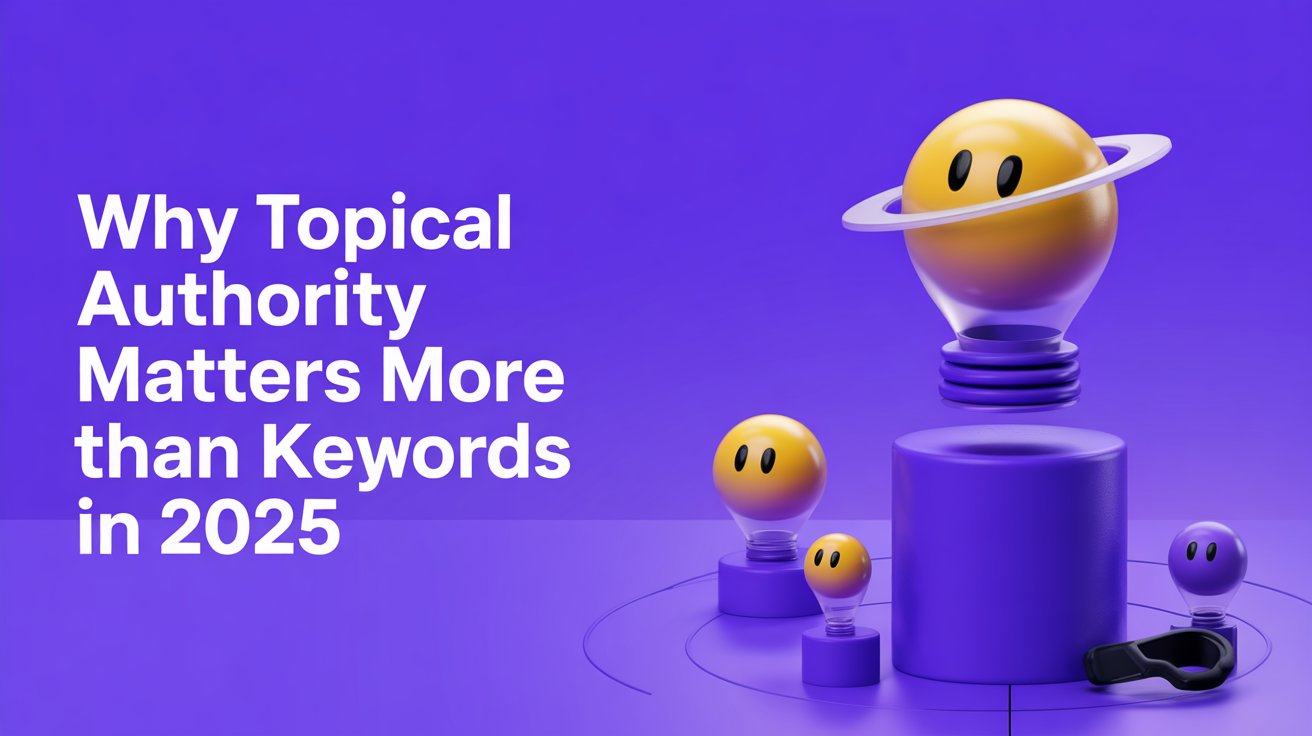Unlocking the Power of Technical SEO: A Guide for Business Growth
Learn how technical SEO boosts site performance, rankings, and user experience.

Search Engine Optimization (SEO) has evolved significantly over the years. Once, the secret to ranking high in search engine results was keyword stuffing—throwing as many targeted keywords into your content as possible. But as search engines became smarter, so did SEO strategies.
In 2025, one crucial shift in SEO that every digital marketer needs to understand is the increasing importance of topical authority over traditional keyword targeting. In this article, we’ll dive into why topical authority is now the golden ticket to higher search rankings and long-term success, and how businesses can leverage it to improve their online visibility.
Topical authority refers to a website’s credibility and expertise within a specific subject area. It’s the idea that the more content you create on a given topic, the more search engines will recognize you as a trusted, authoritative source of information on that subject. This concept is fundamentally different from focusing solely on individual keywords.
Whereas in the past, you might have optimized individual pieces of content for specific keywords, today, search engines like Google are looking at the broader context of your content. They want to know whether you provide comprehensive, valuable, and consistent information across a variety of topics related to your niche.

In recent years, Google has refined its search algorithms to focus more on user intent rather than just matching keywords. This means that simply using the right keywords is no longer enough. Google now evaluates the context and relevance of the content, looking at whether it’s comprehensive and covers all facets of a topic.
The introduction of Google’s BERT and MUM (Multitask Unified Model) algorithms reflects this shift. These algorithms are designed to better understand the meaning behind search queries and deliver results that are contextually relevant and holistic. To rank well, your content needs to go beyond keywords—it must demonstrate authority and thorough understanding of a topic.
Google’s primary goal has always been to provide users with the best possible results. When your content addresses a topic comprehensively and consistently, it leads to a better user experience. This, in turn, can boost engagement metrics, such as time spent on your page, social shares, and backlinks—all factors that contribute to SEO success.
By focusing on topical authority, you’re not just improving your rankings; you’re also ensuring that your content meets the needs of your audience in a way that drives meaningful engagement.
Another reason topical authority matters more than ever is due to the rise of semantic search. Google now understands the relationships between concepts and topics, not just the words themselves. This is where content clusters come into play.
A content cluster is a group of interconnected pages that cover different aspects of a broad topic. For example, if you have a blog about digital marketing, your main topic page could cover the basics of digital marketing, while subtopics (cluster pages) might cover specific areas like SEO, PPC, Content Marketing, etc. Linking these pages together creates a comprehensive web of related content that reinforces your authority on the subject.
This strategy not only helps search engines understand your expertise but also improves user experience by guiding visitors through a logical, easy-to-navigate content journey.
While keywords still play a role in SEO, the emphasis in 2025 is on creating topically relevant content. Start by identifying broad topics within your industry that you want to establish authority in. Then, create a content strategy that covers all the aspects of those topics. Aim to answer every possible question your audience might have.
For instance, if you want to become an authority on eCommerce marketing, your content should cover subtopics like:
Product photography tips
How to set up an online store
Effective email marketing for eCommerce
Best practices for SEO in eCommerce
Building customer trust in eCommerce
By creating in-depth, quality content on these related topics, you signal to Google that your website is a valuable resource for everything related to eCommerce.
To solidify your topical authority, it’s important to revisit and update your existing content. Look for opportunities to expand on topics, include new insights, and ensure your content is up-to-date. By doing this, you maintain relevance and ensure your site remains a trusted source of information.
As mentioned, content clusters play a key role in demonstrating topical authority. When you create new pieces of content, be sure to link them back to your main topic page and vice versa. This not only helps Google understand the structure of your website, but it also provides an easier navigation path for your visitors, enhancing the user experience.
While internal linking is crucial, backlinks from high-authority sites in your industry are equally important. These links serve as votes of confidence for your content, signaling to Google that other reputable sources trust your expertise. Aim to earn backlinks from authoritative websites, blogs, and publications in your industry by creating exceptional, shareable content.
Consistency is key when it comes to building topical authority. Regularly publish high-quality content that addresses relevant aspects of your chosen topic. The more often you contribute valuable insights, the more likely Google will recognize you as an authority.
Historically, SEO has been driven by keyword-focused strategies, where the goal was to rank for specific terms. While keywords still matter, the landscape of SEO has shifted due to changes in search engine algorithms. Today, search engines want to understand the entire context of a search query and provide comprehensive answers.
Focusing solely on keyword targeting doesn’t give search engines the full picture of your website’s expertise. On the other hand, establishing topical authority helps Google understand the breadth and depth of your content, allowing your site to rank higher for a broader range of related queries.
As we move further into 2025, the importance of topical authority in SEO will only continue to grow. By building authority around specific topics, you’ll not only improve your rankings but also provide real value to your audience. A well-thought-out content strategy, combined with consistent efforts to create high-quality, interlinked content, will allow you to dominate your niche and stay ahead of the competition.
SEO is no longer just about keyword rankings; it’s about building trust, expertise, and authority. Embrace these principles, and the rewards will come in the form of sustained traffic, higher rankings, and a stronger online presence.
Learn how technical SEO boosts site performance, rankings, and user experience.
Understand the fundamentals of SEO and learn how to optimize your website to attract more traffic, boost visibility, and grow your business online.